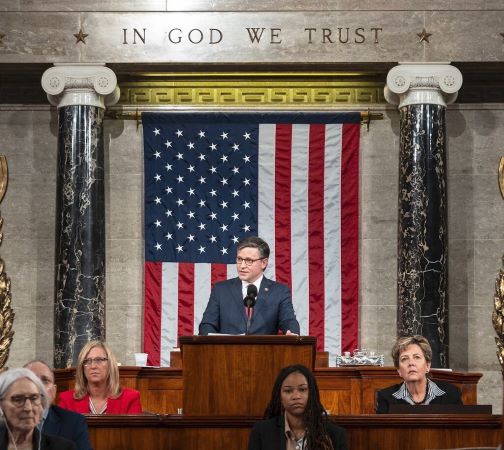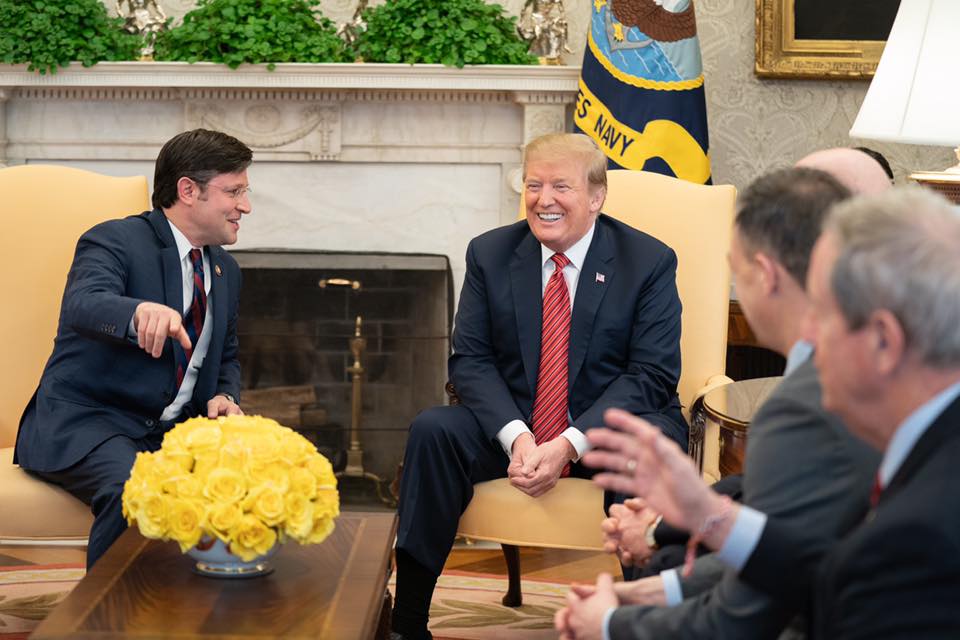
Mike Johnson is opposed to Ukraine, supports Israel and maintains that Trump won the 2020 election
By Tom Arms
MAGA (Make America Great Again) has won the Speakership of America’s House of Representatives.
It is difficult to be more MAGA-like than Louisiana Congressman Mike Johnson.
He is opposed to Ukraine; supports Israel; maintains that Trump won the 2020 election; is a born again evangelical Christian who quotes the Bible whenever possible; voted against the Biden budget; is a member of the right-wing Freedom caucus; is opposed to same-sex marriage; opposes abortion and has Trump’s endorsement.
Moderate Republicans—and just about everyone else—were terrified at the prospect of the election of right-wing “legislative terrorist” Jim Jordan. He seemed more intent on tearing down the political establishment then working with it. So they blocked him, again and again and again.
The moderates wanted Minnesota Congressman Tom Emmer wielding the Speaker’s gavel. They looked as if they might succeed. Then Donald Trump interceded–n a complete reversal of his previously stated neutrality, and in contravention of all political conventions– slammed Emmer for voting to certify Joe Biden’s election and endorsed Mike Johnson.
By this time the moderates had been worn to a frazzle by long nights, ruined weekends and endless rounds of votes. They risked being blamed for a government shutdown if a Speaker was not chosen soon as well as being accused of preventing vital aid reaching war-torn Israel and Ukraine. They voted for Johnson for an easy life.
They will most likely live to regret it. Moderate Republicans are telling themselves that the lesser of two evils has been elected. But the only real difference between Jim Jordan and Mike Johnson is the decibel levels at which they operate. Jordan’s reputation is as a loud-mouthed arch-conservative bully. Johnson is quieter. He has as worked more in the Capitol Hill shadows and he has not been in Washington as long as Jordan. But Johnson is every bit as uncompromisingly far-right as Jordan and just as ruthless in pursuit of his political agenda. The difference is style, not substance.
Johnson also has another characteristic that Jordan lacks. He is perhaps the most religious evangelical Christian in the US House of Representatives. He hosts a Christian podcast with his wife Kelly and his acceptance speech before the House was peppered with Biblical references.

His pre-congressional career included a stint with the Alliance Defense Fund, a conservative Christian organization which campaigns for an end to separation of church and state. Johnson has gone on record to say that “the Founding Fathers wanted to protect the church from an encroaching state, not the other way around.”
Any serious student of American history knows he is wrong. First of all, you have to look at the issue within the context of 18th century Britain and America. Britain had an established state church with the monarch at its head. The church was corrupt and many of those who sailed to America did so because they disagreed with the teachings of the Church of England and its venality.
The US constitution reflects this distrust of a state religion. It does not, as such, spell out separation of church and state. The First Amendment merely says: “Congress shall make no law regarding the establishment of religion, or prohibiting the free exercise thereof…”
It was not until 1802 that Thomas Jefferson (and one cannot be more founding father than Jefferson) clarified the issue in a letter to a Baptist congregation in Danbury, Connecticut. He maintained that the First Amendment clause created a “clear wall” that separates church and state. Every subsequent US judicial ruling has agreed with his interpretation.
This does not sit well with Johnson and many of his ilk. They would like to apply 2,000-year-old Biblical rulings to 21st century secular law books. Furthermore, they believe that they have been chosen by God to perform this task. Johnson said in his acceptance speech: “I believe that… the Bible is very clear; that God is the one who raises up those in authority.”
For most people, the concept of the divine right of kings (or politicians) was fought over and discarded nearly 400 years ago.
 World Review
World Review
Trump has been too tight-fisted for his own good. That is the judgment of number of those observing the trial of ex-president Donald Trump on racketeering charges related to his alleged efforts to subvert the Georgia electoral process.
So far, three lawyers and one bail-bondsman out of 19 of Trump’s co-defendants—have flipped, pleaded guilty and agreed to testify against the ex-president.
One of the main reasons for their change of heart is believed to be astronomical legal fees. America’s top legal eagles are expected to turn up in the Georgia courtroom for the Trump trial. Their fees can be as high as $5,000 per hour and each defendant is expected to have two or three attorneys each for the six-month trial.
The fees for just one lawyer could run to $3.6 million. The latest co-defendant to change sides is Jenna Ellis. Her crowdfunding page raised $216, 431 for legal fees—a drop in the proverbial ocean. This means that most of the co-defendants face the prospect of bankruptcy unless they turn against Trump.
The ex-president may have been able to retain their loyalty by paying their legal fees. He has refused to do so. All the money being raised by his crowdfunding efforts is going to his legal fees alone, except for what he can siphon off for his presidential campaign.
There are other reasons for bail bondsman Scott Hall, and lawyers Jenna Ellis, Sidney Powell and Kenneth Chesebro to switch sides. Agreeing to help the prosecution means that prison time has been more or less ruled out. And the lawyers are hoping that the most they will be found guilty of is a misdemeanor. If the jury opts for a felony charge then they will be disbarred and lose their legal license.
There are, however, risks in turning against Trump. He has repeatedly proven himself to be a vengeful man with thousands of followers prepared to harass those who turn up against him and even issue death threats. And death by shooting is a very real danger in America—as the people in Lewiston, Maine discovered this week.
Why are we waiting? Is the question being asked by thousands of Israeli soldiers camped on the Gaza border and in the street cafes of Tel Aviv and Jerusalem?
Prime Minister Benjamin Netanyahu has promised a ground invasion of Gaza to end the power of Hamas once and for all. But so far no Israeli boots have trod on Gaza ground.
There have been a lot of exploding artillery shells—an estimated 8,000 of them. And there has been a watertight blockade which has left 2.2 million Gazans without food, water, electricity and vital medicines. As a result an estimated 6,000 Gazans—many of them women and children—have died, and the world’s sympathy is shifting from Israel to Gaza.
Iran has warned that if Israel invades Gaza it will order Hezbollah troops in Lebanon, Syria and Iraq to attack Israeli and American targets
None of this has affected the Israeli public’s thirst for vengeance for the estimated 1,300 deaths inflicted by Hamas. So, why are they waiting? Several reasons, good and bad.
For a start there are the 200-plus hostages being held by Hamas. As of this writing, four have been released and it is believed that up another 50 may be set free. They are mainly women and children and foreign nationals. Western nations are keen that Netanyahu does nothing to endanger the lives of their nationals, and he needs their support. Hamas will want to hold onto captured Israeli soldiers to exchange them for the 4,500 Palestinians held in Israeli jails.
Next there is the danger of opening a second front in the Middle East. Iran has warned that if Israel invades Gaza it will order Hezbollah troops in Lebanon, Syria and Iraq to attack Israeli and American targets. Some attacks have already occurred and there has been limited retaliation. Israel wants to make certain that promised American Patriot missiles are in place as well as additional US ground troops and Mediterranean and Gulf-based ships. The hope is that a strong American presence—coupled with diplomatic pressure—will deter Iran.
Third, there is the problem of fighting an urban war, especially in densely-packed Gaza whose underworld is honeycombed with hundreds of miles of tunnels. American officials have expressed concern that the Israelis need more intelligence before crossing the border.
Next on the list is uncertainty about the exit strategy. Going in, shooting about and leaving will allow Hamas to re-form, probably using its Qatar-based leadership as a core. A permanent occupation would be costly in lives, reputation and money. Shifting responsibility to the Palestinian Authority would destroy the West Bank’s Palestinian Administrators already badly tarnished reputation.
Finally, there is Netanyahu’s political future. Few believe he has a chance of surviving the crisis. 1,300 Israelis died on his watch while he was claiming that he had a firm lid on Hamas. When the dust has settled there will be an official inquiry and the blame finger will almost certainly be pointed at the Likud prime minister. The longer he can put off the ground invasion, the longer he can delay the inquiry and the more time he has to shift blame onto other shoulders.
Qatar: broker extraordinaire, is a term being used increasingly in the Middle East to describe the Gulf Emirate. It performs much the same role as Vienna during the Cold War.
So far its position has led to the release of four hostages held by Hamas in Gaza. It may also be helping to restrain Iran.
There are only 300,000 Qatari citizens. But the Gulf Emirate run by the al-Thani family is the world’s third largest exporter of natural gas. It uses its wealth to project political power in the Middle East and beyond out of all proportion to its size.
For a start, Qatar is home to the Al Jazeera news network which rivals the BBC and CNN as one of the world’s most powerful and respected news organizations, especially in the Arab-speaking world.
There are 10,000 American troops in Qatar and the Qatari government cooperates with the US on counter-terrorism issues throughout the Middle East and the Horn of Africa
It also maintains good relations with all the main players in the Middle East. The Hamas leadership is based in the capital Doha. The Taliban had its main offices there during the ten-year war in Afghanistan and Doha played host to the talks that resulted in NATO withdrawal. Forty percent of those evacuated from Afghanistan were routed through Qatar.
There are 10,000 American troops based at Al Udeid Airbase and the Qatari government cooperates with the US on counter-terrorism issues throughout the Middle East and the Horn of Africa. In 2022, President Biden named Qatar as a vital non-NATO ally.
But at the same time, Qatar also has good relations with Iran and Hezbollah. In 2008, for instance, it brokered a deal in Lebanon between Hezbollah and the opposing Maronite forces. The Doha government speaks to everyone on behalf of everyone and is possibly the best chance of releasing the Hamas hostages and, hopefully, defusing the current crisis.
______________
 Tom Arms is the foreign editor of Liberal Democratic Voice and author of “America Made in Britain. He is also host of the podcast ‘Transatlantic Riff’ which can be heard by clicking here https://omny.fm/shows/the-talk-station/gregory-treverton
Tom Arms is the foreign editor of Liberal Democratic Voice and author of “America Made in Britain. He is also host of the podcast ‘Transatlantic Riff’ which can be heard by clicking here https://omny.fm/shows/the-talk-station/gregory-treverton